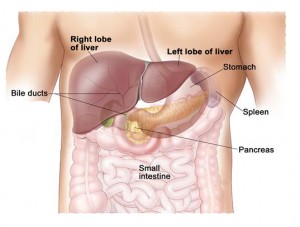Sources: National Cancer Institute; American Cancer Society; PUBMED
 THE LIVER is one of the largest organs in the body. It has four lobes and fills the upper right side of the abdomen inside the rib cage. Among it’s important functions are: Filtering harmful substances from the blood; Making bile to help digest fats from food; and, Storing glycogen (sugar), which the body uses for energy.
THE LIVER is one of the largest organs in the body. It has four lobes and fills the upper right side of the abdomen inside the rib cage. Among it’s important functions are: Filtering harmful substances from the blood; Making bile to help digest fats from food; and, Storing glycogen (sugar), which the body uses for energy.
Adult pimary liver cancer (hepatocellular carcinoma) is a disease in which malignant (cancer) cells form in the tissues of the liver. It is estimated that there will be 28, 720 new cases of liver cancer and 20,550 and deaths from liver and intrahepatic bile duct cancer in the United States in 2012. And the numbers are rising. The incidence of liver cancer in the US has increased from 1.4 per 100,000 population to 2.4 per 100,000. Among black men, the incidence is 6x higher than white men in the US. Given that as a population, Asians have a higher carrier rate of Hepatitis B, Vietnamese-American men are 13x more at risk, Korean-American men are 8x more risk and Chinese-American men are at 6x more risk for liver cancer. There has been a 41 percent increase in the mortality rate from primary liver cancer. The age-specific incidence of this cancer has progressively shifted toward younger people. Why is the rate of liver cancer increasing? Risk factors attributed to the increase in liver cancer include:
- -Cirrhosis (5% of patients eventually develop liver cancer)
- -Hepatitis B infection (a factor in 80% of all liver cancer cases)
- -Hepatitis C infection (the most significant causes of liver cancer worldwide)
- -Chemicals (Aflatoxin has also been implicated as a factor in parts of the world where this mycotoxin occurs in high levels in ingested food)
- -Obesity (in the US in particular)
Primary Liver cancer still relatively uncommon in the United States. Here, metastatic cancer in the liver is far more common than primary liver cancer. Metastatic cancer is cancer that has spread from the place where it first started to another place in the body. A tumor formed by metastatic cancer cells is called a metastatic tumor or a metastasis. Metastatic cancer has the same name and the same type of cancer cells as the original, or primary, cancer. For example, breast cancer that spreads to the lungs and forms a metastatic tumor is metastatic breast cancer, not lung cancer. Although some types of metastatic cancer can be cured with current treatments, most cannot. So if you are diagnosed with liver cancer, there is a good probability that you have a primary cancer somwhere else in your body. The primary symptoms of liver cancer are:
- -A hard lump on the right side just below the rib cage
- -Discomfort in the upper abdomen on the right side
- -Pain around the right shoulder blade
- -Unexplained weight loss
- -Jaundice (yellowing of the skin and whites of the eyes)
- -Unusual tiredness
- -Nausea
- -Loss of appetite
A mass or tumor in the liver (found on MRI or CT scan) is often the only clue. Liver cancer is potentially curable by surgical resection, but surgery is the treatment of choice for only the small fraction of patients with localized disease. If the cancer is metastatic, then cure is unlikely. The prognosis (chance of survival) depends on the degree of local tumor replacement and the extent of liver function impairment. Therapy other than surgical resection includes: chemotherapy; hepatic artery ligation or embolization; percutaneous ethanol injection; radiofrequency ablation; cryotherapy;and radiation.
Some patients may go into remission and a few patients (without metastatic disease) may be candidates for liver transplantation. There are a limited number of livers availabile in the US for transplantation. One of our clients, who unfortunately died from his late diagnosed liver cancer, had tried to obtain a liver donor from Korea prior to a recurrence of cancer.
The Lewis Law Firm represents patients who have been diagnosed late with liver cancer and metastatic cancer. If you or a loved one have been diagnosed with liver cancer contact the Lewis Law Firm for a FREE consultation and case review, today.
